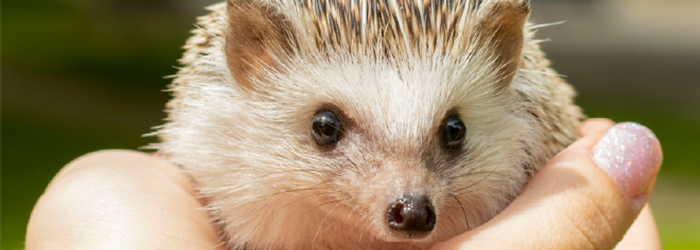How to Care for a Hedgehog
Caring for a hedgehog brings joy, excitement and a couple of unique care components. With a few tips and tricks in your toolbelt, it will be a simple and rewarding task to keep your pet healthy and happy in your home.
Here are three ways to take special care of your special pet.
Build Your Hedgehog’s Dream Home

Housing plays an important role in your hedgehog’s quality of life. Cages commonly used for small animals like guinea pigs and rabbits tend to work fine when it comes to hedgehog housing, but wire-grate cage floors have the potential to injure your pet’s little feet. Plus, since hedgehogs like to climb, wire cages could pose a threat to the security of your little escape artist’s enclosure.
Whether it’s recycled paper or clean towels, keep soft bedding on hand to protect those sensitive toes, and ensure the bedding is cleaned or replaced often. As insectivores, your hedgehog’s feces can be stinkier than other species. Prioritize cleaning your pet’s habitat often to keep odors down.
Cleaning the cage first thing every morning is ideal, since hedgehogs are nocturnal and are likely to sleep for most of the day. A hedgehog is a very active pet, but more so at night.
A large, enclosed running wheel is great for these energetic creatures. Plenty of space to run, play and burn off extra energy is key. They are likely to run several miles per day when allowed the opportunity, and this level of exercise is closely tied to their happiness.
If you are able, provide some space for your hedgehog to run around under close supervision in a backyard space during the warmer times of the year. Consider utilizing a large hamster ball or even a warm bath for indoor running and swimming when the weather is not-so-nice.
To provide some privacy and comfort, consider adding a hide box or sleeping cave to your hedgehog’s habitat. These extras along with the basic food bowl and water bowl will have your pet living the dream life in their dream home.
Perfect Your Hedgie’s Diet
A species-specific diet is key for maintaining digestive health. It’s also important for your hedgehog’s feed to mimic the crunchy texture of the insects they eat in the wild in order to keep their dental health.
Especially in combination with frequent exercise, an insectivore diet will help your hedgehog’s health thrive. The Mazuri® Hedgehog Diet simulates the typical high-protein, high-fiber diet these insectivores crave. Ingredients like vitamin E and fatty acids support growth, development and health for hedgies at any stage of life.
With a flavor they’ll love, your pet will be happy to chow down on wholesome nutrition from Mazuri. This tasty feed also contains a crunchy texture and a variety of animal ingredients for insectivores like your hedgehog. No insects required!
One of the most common health concerns for hedgehog owners is tooth problems, which can inhibit your pet from eating any food at all. This is often because they’ve been fed a mash or soft canned food because the hedgehog may enjoy the taste. According to Dr. Jen Parsons, a Mazuri nutritionist with extensive experience with small animals, this is not good for your pet’s teeth nor their overall health.
Protect Your Pet’s Health
Even when feeding a hedgehog properly, continue to prioritize an annual vet visit to keep tabs on potential dental problems or lost teeth.
Quill loss is actually normal for hedgehogs, but only when it happens in small amounts. If your hedgehog is losing so many quills that bald patches are appearing, this could be a sign of mites or other common parasite infestations.
Eye injuries are another common occurrence for small animals like hedgehogs. If they become infected and go untreated, excessive scratching could cause your hedgie to lose an eye.
Whether your hedgehog is the pinnacle of health or exhibits a symptom of any health issue, make sure to seek regular checkups and professional veterinary advice.
Explore Mazuri articles and videos to learn more about small animal species.
